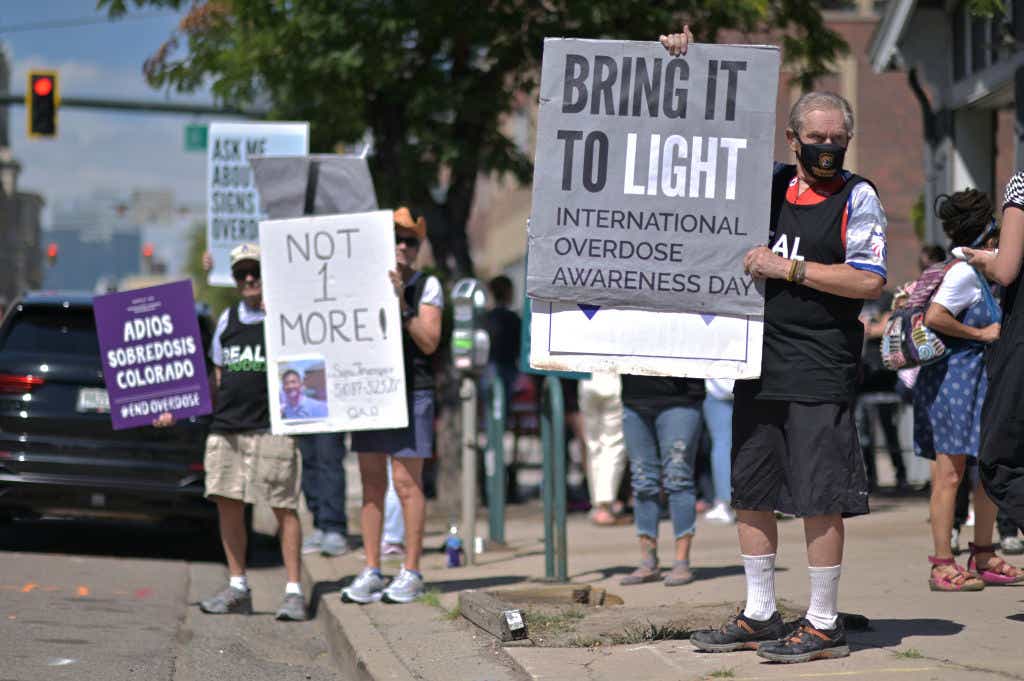Of all the epidemics within the COVID-19 pandemic, none’s been deadlier than the drug crisis. More than 100,000 Americans died from an overdose in 2021 — an all-time record. Fentanyl, a highly potent opioid, is increasingly appearing in not just heroin, but drugs like cocaine and pressed pills too, putting even more Americans at risk of fatal overdose.
The drug policies we have in place are not meeting this moment. That’s because our drug laws are rarely decided by what would be best for public health. After decades of cracking down and “getting tough,” we’ve now got record-high overdose and addiction rates, with drugs cheaper and more potent than ever. The ripple effect of this approach to drug use has led to mass incarceration, increased surveillance, deadly botched drug busts, ever-widening racial injustice, and now, hand-wringing about the border.
The problem clearly isn’t that we haven’t been hard enough on drugs. For years now, police chiefs themselves have been saying that we can’t arrest our way out of this crisis. So why are we still trying to? What if our state and federal governments poured even a fraction of these resources into approaches that have been proven to be effective?
Overdose Prevention Centers (OPCs), sometimes also called Safe Consumption Sites, are one of those approaches. OPCs offer a safe, clean, protected space where people can bring in their own drugs and use them under medical supervision. These sites are hardly the seedy drug dens of our shared imagination — they look even nicer than most therapists’ offices. They’re staffed by highly trained and highly compassionate individuals who are prepared to respond to an overdose if needed.

From Canada to Australia, countries that have opened up OPCs have studied them carefully, and the evidence is very encouraging. First and most importantly, they meet their aim with 100% accuracy: No one has ever died from an overdose while at an OPC. Beyond that, OPCs have been shown to reduce overall overdose rates in their surrounding neighborhoods, reduce needle sharing and infection risk, and increase the likelihood of a person initiating additional treatment.
These centers benefit wider communities, too. There’s been no evidence that an OPC increases crime or violence in their neighborhoods. In fact, just the opposite is true: The presence of an OPC in a given community has been associated with reduced public drug use, reduced syringe waste, and millions of dollars in savings. One study in Sydney even reported “a significant decline in robbery and property offenses both in the vicinity of the [OPC] and across the city,” over a 10-year period following its opening. Another study in Vancouver found that after one OPC’s opening, “rates of vehicle break-ins/theft declined significantly.”
Despite all this, many leaders aren’t convinced. Take New York City, for example: In December of 2021, it became the first city in the United States to open Overdose Prevention Centers. Since their opening, the city’s two facilities have reversed more than 300 overdoses. More than half of the people who’ve visited also received additional support services, like counseling and take-home doses of naloxone, a lifesaving medication that reverses the effects of opioids on the brain, restoring normal breathing within minutes (as long as it’s administered quickly).
Still, New York state officials punted their chance to fund OPCs, and Governor Hochul has so far kept mum on the issue, despite sustained advocacy by local groups asking her to support them. Across the country in California, Governor Newsom recently vetoed a bill that would establish OPCs in Los Angeles and San Francisco. His decision is most likely the result of his personal political aspirations, rather than the best interests of Californians.
The latest wave of the overdose crisis is truly frightening: Fentanyl is powerful and it’s everywhere. Potency is unknowable on the underground market, meaning one bad dose can be lethal. But that’s why it’s all the more important for leaders to share facts, support evidence, and empower citizens to keep themselves and their loved ones safe in rational, practical ways. Declaring fentanyl a weapon of mass destruction hardly helps save lives. It only fuels the mania of the U.S. drug war.
Nobody is born understanding the complexities of tough topics like these. In fact, when it comes to drugs, each of us has so much unlearning to do before we can even get to the learning part. We’re taught from a young age that those with addiction are bad people who deserve punishment, not suffering people who deserve help. There’s so much misinformation, fear, and judgment to sort through.
But we’re running out of time for that. We’ve done plenty of awareness-building, and we’ve funded plenty of studies. When it comes to overdoses, it’s time to lead without apology. As the epidemic continues to spiral out of control, midterm candidates would do well to go on the offense. Support evidence-based policies. Actively advocate for them. Explain the facts and help people understand.
And when candidates who support these policies are cynically asked why they’re comfortable “enabling” people who use drugs, they shouldn’t shrink in shame or get defensive. They should simply ask in return why those who oppose these policies are comfortable allowing people to die.
Jess Keefe is a writer, editor, and advocate. Her work has appeared in Runner’s World, Teen Vogue, McSweeney’s Internet Tendency, and elsewhere. Her debut memoir Thirty-Thousand Steps is forthcoming from Prometheus Books in December.









